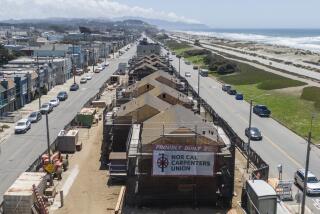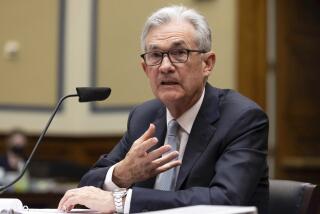Quarterly Forecast by UCLA Economists : Inflation Surge Predicted for 1988
- Share via
Recent declines in interest rates and oil prices could, ironically, help to trigger a return to inflation and high interest rates by 1988, UCLA economists said Wednesday.
The university’s Graduate School of Management, in its quarterly economic forecast, predicted that oil prices, which have dropped to about $11 a barrel from about $31 in the last few months, will increase rapidly in 1988. This will lead to substantial inflation in energy costs overall, the report said.
“The irony is that if crude oil prices had dropped more gradually, they might have contributed to lower inflation rates over many years,” said Larry J. Kimball, director of the school’s Forecasting Project, who explained that significantly lower prices would stimulate demand and, in turn, push up energy prices.
He added in a telephone interview that he expects the Reagan Administration to pursue a softer monetary policy intended to force faster economic growth. The recent cut in the discount rate by the Federal Reserve was part of this easy-money policy, Kimball added.
“We’ll have two good years,” he said. But in 1988, under the UCLA scenario, a cheap money policy could hasten a new round of inflation with a prime rate as high as 16%. The prime rate, the rate that banks charge their best customers, is currently 9%.
The UCLA economists’ view of the future is gloomier than that of many other experts in the field. According to Robert J. Eggert, editor of Blue Chip Economic Indicators, a Sedona, Ariz., publication that polls 50 economists monthly, most of them see “inflation going up a shade and interest rates continuing to come down” through 1991.
Kimball acknowledged that the UCLA group “is a bit out on a limb,” largely due to its widely different expectations of economic growth. The UCLA group believes that the real gross national product (adjusted for inflation) will grow quickly--expanding by 3.7% this year, 4.3% in 1987 and slowing to 2.5% in 1988.
But Eggert said the consensus view is that economic growth, as measured by the real gross national product, should expand by 3.2% this year, 3.1% in 1987 and 3.4% in 1988. Eggert said such a growth rate would be slightly above the average 2.9% growth rate that has prevailed for most of this century.
Kimball says he believes that the Reagan Administration is under pressure to nurture fast economic growth to meet the budget deficit targets of the Gramm-Rudman budget-balancing law. Those provisions can be met only by a bustling economy that produces new tax revenue or by an economy so weak that the provisions can be waived.
More to Read
Sign up for Essential California
The most important California stories and recommendations in your inbox every morning.
You may occasionally receive promotional content from the Los Angeles Times.













